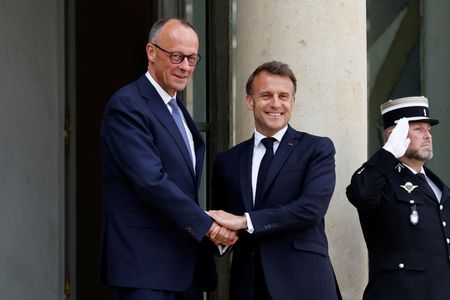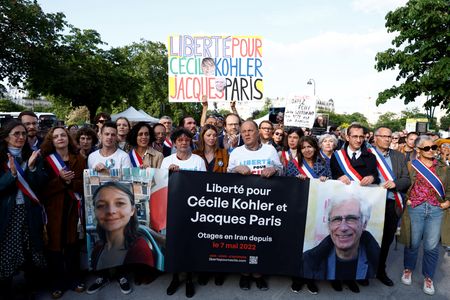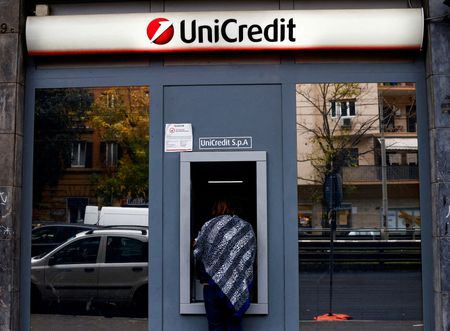By Sarah Marsh, Benoit Van Overstraeten and Andreas Rinke
BERLIN/PARIS (Reuters) – New German Chancellor Friedrich Merz announced a reset in French-German relations to help Europe overcome the “enormous” security and economic challenges it faced during his first trip abroad since taking office to top ally France on Wednesday.
Hopes are high among European allies that Merz will restore German leadership in Europe after years of infighting within former Chancellor Olaf Scholz’s three-way coalition and its implosion in November.
The French-German motor that has traditionally powered the European Union in particular appeared to falter during Scholz’s tenure. Merz and French President Emmanuel Macron, both more European-minded and mercurial personalities with private sector experience, may prove to be a more dynamic duo, analysts say.
Europe must become more secure and competitive, which requires it to be more unified, Merz said at a joint news conference with Macron in Paris.
“We will only be able to meet these challenges if France and Germany stand even more closely together than in the past,” he said. “That is why Emmanuel Macron and I have agreed on a new Franco-German push for Europe.”
They would for example strengthen the Franco-German defence and security council, Merz said.
“We want to better coordinate our support for Ukraine within this framework, align our national defense planning and procurement projects even more closely, and also find new answers to strategic questions of security and defense policy,” he said.
In a joint op-ed in French newspaper Le Figaro, they said they stood ready to “contribute to a just and lasting peace (in Ukraine), with the support of the United States on security, and strong security guarantees”.
Merz said, however, he could only give details on possible German security guarantees once there is an agreement “because we simply don’t know the conditions yet”.
Paris and Berlin will also accelerate joint programmes to develop new defense capabilities that go beyond combat tanks and long-range missiles, Macron said.
Merz appears more receptive than Scholz to French proposals on European strategic autonomy and common defence, in part due to the growing unreliability of the United States under President Donald Trump, analysts said before the visit.
He secured a historic fiscal package in parliament that would enable his government to dramatically increase defense spending even before taking office.
Differences between France and Germany remain, such as on an EU trade deal with South America’s Mercosur bloc which Paris has resisted. But Trump’s policies, in particular his tariffs that have intensified the need for other trade partners, could push them closer together here too, say analysts.
“I know there are still some points France wants addressed in regard to these agreements, but I believe these are individual matters that do not call the whole into question,” Merz said.
BUMPY START
The trip comes amid a bumpy start for Merz who was sworn in as chancellor on Tuesday. His unprecedented failure to be elected in the first round of parliamentary voting has dampened hopes the coalition of his conservatives and Social Democrats might prove more harmonious than Scholz’s government.
Still, Merz, who started his career as a deputy in the European Parliament from 1989-94, has vowed to ensure his government speaks with one voice on the global stage – after years in which Scholz, his foreign minister and finance ministers all appeared to have diverse agendas.
For the first time in years, the chancellery and the foreign ministry will be run by the same party. Merz also wants to establish a national security council in the chancellery to better coordinate all foreign, development and defence policy.
Merz will visit Poland later on Wednesday, reflecting the country’s increasing importance in European politics due to its key role in rallying support for Ukraine against Russia’s three-year-old invasion.
“I would hope for some common leadership in Europe,” a Polish government source told Reuters. “Germany has been somehow missing in these discussions over the past.”
The source said a key question was how Merz’s government planned to increase defence spending, noting it would make sense for European countries to purchase equipment together.
Merz told state broadcaster ZDF late on Tuesday he would also speak with Macron and Polish Prime Minister Donald Tusk about adopting a tougher European migration policy.
The incoming coalition has agreed to reject asylum seekers at Germany’s land borders, in coordination, however, with European neighbours.
(Reporting by Sarah Marsh, Andreas Rinke, Kirsti Knolle and Rachel More in Berlin, Michel Rose, Benoit Van Overstraeten and Richard Lough in Paris and Alan Charlish in Warsaw; Editing by Cynthia Osterman and Ed Osmond)














